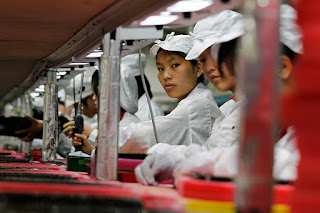In this article, which appeared first in Boston Review (see note 2), before appearing in Salon.com, Locke asks the important question: "Can global brands create just supply chains?" His opening comment is: "To do so, the public will need to hold companies like Apple and Nike accountable for fair labour standards." The article is quite long, however it's well worth the read, providing a detailed and comprehensive overview of the global supply chain involved in the production of many of the goods we value, and why hoping that corporations "police" themselves is misplaced hope. He calls for significant engagement by civil society and governments.
Note 2: I hadn't heard of Boston Review before, so I looked it up. On its website, it describes itself this way: "Boston Review is a magazine of ideas, independent and nonprofit. We cover lots of ground—politics, poetry, film, fiction, book reviews, and criticism. But a few premises tie it all together: that democracy depends on public discussion; that sometimes understanding means going deep; that vast inequalities are unjust; that human imagination breaks free from neat political categories; and that powerful images are worth piles of words." I might add that the cover title of the most recent Boston Review is JUST WORK: A Corporate Responsibility?.
Posted here are the first few paragraphs of Locke's article, followed by a link to the whole article:
 |
| Workers are seen inside a Foxconn factory in the township of Longhua in Guangdong province. (Credit: Reuters/Bobby Yip) |
In the past, his appeal would probably have fallen on deaf ears. But today, throughout the world, buyers in many industries have acknowledged a degree of responsibility for workplace conditions in supplier factories and pledged to ensure that the goods they eventually market are not made under abusive, dangerous, environmentally degrading, or otherwise unethical conditions. These businesses have committed to using private, voluntary regulation to address labor issues traditionally regulated by government or unions. And for the most part, the companies have acted on these commitments.
But have these private efforts improved labor standards? Not by much. Despite many good faith efforts over the past fifteen years, private regulation has had limited impact. Child labor, hazardous working conditions, excessive hours, and poor wages continue to plague many workplaces in the developing world, creating scandal and embarrassment for the global companies that source from these factories and farms.
That is my reluctant conclusion after a decade studying this issue. Before I turned my attention to global labor standards, I was a student of labor and politics in Western Europe and the United States. I came to the idea of private regulation with the hope that it might be a new, suppler way of ensuring workers fair compensation, healthy and safe conditions, and rights of association.
To test that hope, I began studying Nike because I was impressed with its commitment to labor standards. After several years of effort, with many conversations and visits to corporate headquarters, I convinced the company to share its factory audit reports and facilitate visits to its suppliers. Eventually my case study evolved into a full-fledged research project involving the collection, coding, and analysis of thousands of factory audit reports; more than 700 interviews with company managers, factory directors, NGO representatives, and government labor inspectors; and field research in 120 factories in fourteen different countries. What began as a study of one company (Nike) in a particular industry (athletic footwear) grew to include several global corporations competing in different industries, with different supply chain dynamics, operating across numerous national boundaries.
But what started in hope ended in disappointment. ...
Access the whole article by clicking here.
- submitted by Gareth
No comments:
Post a Comment